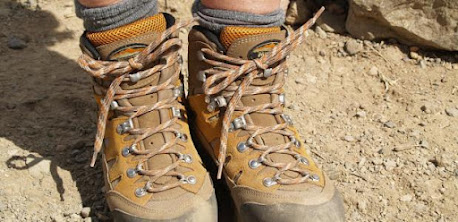Why I prefer wild camping
Greenland, back in 2017. I suddenly wake up. Something has stumbled against one of my guylines, gently shaking my tent. I carefully sit up in my sleeping bag. It happens again. As silently as possible, I unzip my tent door. In the barely-twilight of the arctic August night, I can just spot a white arctic fox with its remarkable, hopping trait running away. Wild camping creates memories that will stay with you forever.
Advantages of wild camping
Wild camping saves you money otherwise spent on hotels or cabins, allowing you to travel more often and stay longer. More importantly, it allows you to immerse yourself more fully in nature, not having to stress to make it back to urban spaces at the end of the day. You can stay. You can sleep. Remote places open up under your feet. And who knows what you'll wake up to? A splendid sunrise, a sky full of stars, rain, the calls of birds? It's always a suprise.
More even than the practical advantages of wild camping, I like the philosophy behind it. How is it possible to own land and then keep people off it? The mountains, the trees, the water? It should be ours, to walk and to explore and, not the least, to sleep out on. Wild camping is its own radical reclaiming of the land as ours, belonging to all of humankind rather than to companies or individuals. The fact that it's technically illegal (though rarely enforced) in many places merely adds an exciting edge. I believe it's important to keep your own moral compass rather than blindly following the law, which tends to protect wealth and property foremost. Why is something forbidden? Is that justified? Is harm being done? If you're quiet, camp away from roads and houses, don't leave rubbish and don't stay long in the same place, I think there's literally no problem with wild camping. By the way, who will even know? In my experience, only few are willing to stray in nature after sunset. It seems like even adults are still scared of falling darkness, of animals and strange noises, of cold. So far, I've spent an estimated 160 nights wild camping, and not once I've been asked to leave.
My most beautiful wild camping spots so far
A tent pitched in a beautiful spot out in nature makes a great photography subject. These photos are some of my favorites:
 |
| My little green tent, looking dangerously close to the sheer cliffs of the Faroe Islands. I only realized how close I pitched my tent to these cliffs when I went for an evening walk. |
 |
| Wild camping along the Kungsleden, Sápmi, north Sweden. I pitched my tent just before the rain set in. Who doesn't love the sound of rain of a tent fly? |
 |
| Wild camping deep in the fjords of southwest Greenland, where I was treated to an intense northern lights display that lasted for hours. |
How to find a good wild camping spot
Planning ahead using a hiking map: start by finding a fresh water source on the map. Rivers or streams have the best water quality, but lakes can also be drinkable if you're in colder climates and far away from buildings and farmland. Then look for a level places near the drinking source, indicated by wider space between the countour lines. Last, look for indications about the type of terrain, if your maps offers that information. Terrain to avoid: bog, shubbery, boulder or scree fields.
By sight: Look around if you can spot a place that's more or less level. Valleys offer more shelter from the elements, but ridges, hilltops and other more exposed places can be really rewarding camp spots too, with their wide views. Then look carefully at the type of terrain and vegetation. It takes time to learn how to accurately assess terrain from a distance. Vividly bright green moss (the kind that almost hurts your eyes), cotton grass and tall grasses usually indicate bog, so that's no good camp ground. Look instead for patches of low grass or bare earth or sand. A carpet of moss can work if it's dry enough - press on it with your hands to see if water wells up. In forests, watch out for sharp objects that might tear your tent floor. It might be possible to camp on bare rock if there are smooth rocks lying around to use instead of stakes. Avoid bracken in summer: ticks like it. Also avoid pitching your tent in the lowest place of the area: water will maybe gather in case of heavy rain. For the same reason, never set up your tent too close to a river or stream. Lastly, check for other potential safety hazards. Trees that may drop a branch, a scree slope that may cause a rock avalanche. If you can't find a place to pitch your tent and you're exhausted, you can always just lie down on your sleeping mat and and wrap your sleeping bag and tent around you, essentially creating a bivy bag. You probably won't sleep very well, but you'll get through the night just fine.








Mooie foto's weer Melis! En mooie stuk ´free thinking : "I believe it's important to keep your own moral compass rather than blindly following the law¨: helemaal mee eens!
ReplyDeletenice
ReplyDelete